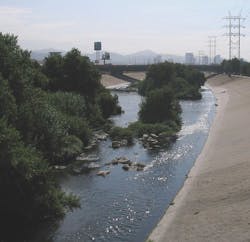Reclamation: Stormwater capture and recharge critical to sustain water supplies in Los Angeles area
WASHINGTON, DC, NOVEMBER 21, 2016 -- Bureau of Reclamation Commissioner Estevan López has released the Los Angeles Basin Study that looks at the changing demographics, climate change and competing interests for available water supplies and identifies options to meet the water needs of the Los Angeles area into the future. The study found that there is a potential water supply deficit for the region of approximately 160,000 acre-feet-per year by 2035 and 440,000 acre-feet-per-year or 25-percent less water than the region is projected to need in 2095.
"Reclamation and our partners in the Los Angeles area are working to assure a sustainable water supply now and into the future," Commissioner López said. "The basin study provides our partners the information that they need to further study the various alternatives for future water supplies while reducing their reliance on the state water project and the Colorado River Aqueduct."
The study compiled and assessed the potential impacts of climate change in the Los Angeles area. These impacts include possible variations in precipitation and changes in the timing and intensity of storms through 2095, temperature increases of 3.5 degrees to 4 degrees Fahrenheit along the coast and 4.5 degrees to 5.5 degrees Fahrenheit in the mountains and desert, an increase in sea-level of 5-24 inches by 2050 and 17-66 inches by 2100, and an increased wildfire risk.
The Los Angeles area relies on imported water from the state water project and the Colorado River for about 57 percent of its current water supply. These imported supplies may be negatively impacted in the future by climate change, drought, and increasing demands. To address this increased uncertainty, the study focused on local water supply sources such as groundwater, which is an important component of the area’s overall water supply portfolio.
The Los Angeles County Flood Control District, a partner in this study with Reclamation, placed a strong emphasis on stormwater capture for groundwater recharge. In addition, recycled water and other local supplies were studied to assist with groundwater recharge. These adaptive concepts were divided among local, regional, storage solutions and management solutions.
The Los Angeles Basin covers approximately 2,040 square miles and features a population of 9.9 million people that is projected to increase to more than 11 million through the next several decades. Nearly 92 percent of Los Angeles County's population resides within the basin, more than one-fourth of the State of California's 38.8 million residents.
This basin study was conducted as part of Reclamation's WaterSMART Program and was cost-shared between Reclamation, Los Angeles County Flood Control District and 20 local project partners. It is available on Reclamation's Basin Study Program website at http://www.usbr.gov/watersmart/bsp/.
WaterSMART is the Department of the Interior's sustainable water initiative that uses the best available science to improve water conservation and help water resource managers identify strategies to narrow the gap between supply and demand. For more information on the WaterSMART program, visit http://www.usbr.gov/WaterSMART.
RELATED ARTICLES
Reclamation awards nearly $300,000 for three innovative water treatment research projects
Financial incentives approved for water recycling projects in Los Angeles, Riverside counties
Water treatment research funding now available via Bureau of Reclamation
